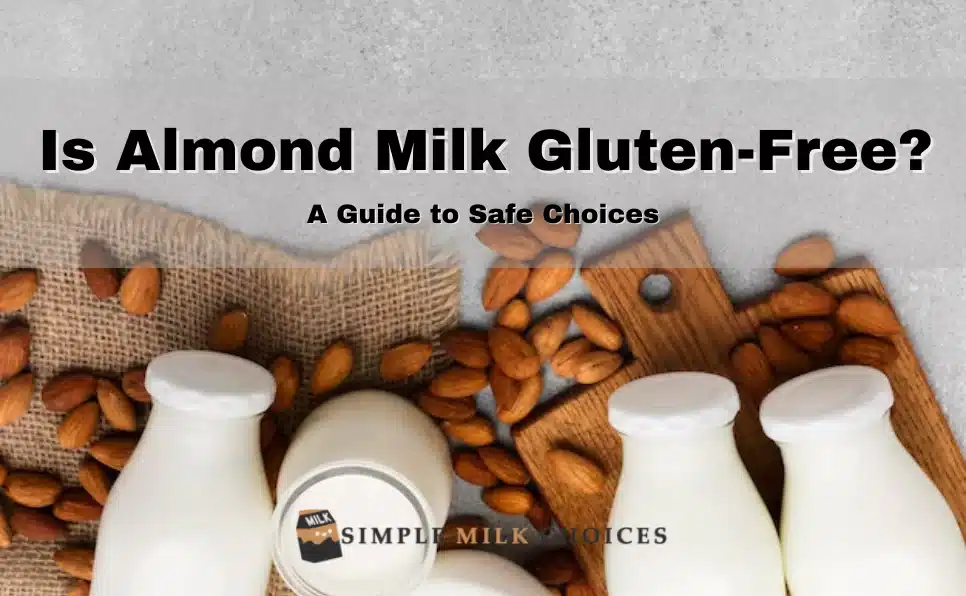Almond milk stands out as a top choice among non-dairy milk options. Many are curious about its taste, which is unique due to the process of blending almonds and water, followed by straining to create a creamy, slightly nutty flavored liquid. Almond milk has a long history extending back hundreds of years, having started in the Middle Ages and gradually becoming a staple in families. This article will look into whether almond milk is gluten-free. We’ll explore how to determine if almond milk is free from gluten.
Composition of Almond Milk
Almond milk is made from two main ingredients: almonds and water. Here is a more intensive gander at what compels almond milk:
Almonds
These are the almond tree’s seeds. They previously absorbed water to mellow them. Then, at that point, these mellowed almonds are mixed with more water to make a smooth fluid. This fluid is stressed to eliminate any bigger parts, bringing about a smooth, velvety texture that looks like milk.
Water
It’s the essential fluid used to mix with the almonds. When almond milk has the proper consistency, water helps make it so. The proportion of almonds to water can shift, influencing the thickness and extravagance of the result.
Additionally, commercial almond milk could contain extra ingredients, for example:
Sweeteners
To add a bit of pleasantness, a few brands could incorporate sugar, honey, or different sugars.
Thickeners/Stabilizers
These are substances that help keep the liquid’s texture smooth and prevent it from separating. Ingredients like carrageenan or guar gum may be utilized.
Fortifications
To help with dietary benefits, some almond milk items may be energized with nutrients like calcium, vitamin D, or vitamin E.
Interpreting Gluten
Gluten: What is it?
Rye, wheat, and barley are good sources of gluten, a protein. It is in charge of the elasticity of the dough and the chewy texture of bread. However, for people with celiac sickness or gluten responsiveness, consuming gluten sets off an unresponsive response that harms the small digestive tract, prompting different medical problems.
Gluten-Free Lifestyle
Prioritizing gluten-free ingredients is essential for anyone trying to follow a gluten-free diet. Whether you’re considering coconut milk, soy milk, or sweetened condensed milk, ensuring they’re gluten-free is essential. For certain people, eating food sources with gluten can cause medical problems like stomach torment, bulging, or more difficult circumstances like celiac sickness or gluten awareness.
Why Go Without Gluten?
People choose a without gluten way of life in light of multiple factors. For those with celiac sickness, eating gluten sets off a safe reaction in the body, harming the small digestive system. For others with gluten responsiveness, even modest quantities of gluten can prompt uneasiness or medical conditions. Certain people also choose a gluten diet since they accept that it makes them feel better or livelier.
What to Avoid When Eating Gluten-Free
When adopting a gluten-free lifestyle, it’s essential to avoid foods that include wheat, grains, and rye. This incorporates items produced using these grains, like bread, pasta, cakes, and certain sauces. Checking food marks is essential to ensuring there are no secret wellsprings of gluten.
Gluten-Free Alternatives
There are a lot of gluten-free alternatives out there, which is a good thing. Food varieties produced using rice, corn, quinoa, and gluten oats are protected choices. Additionally, you can look through a variety of options in-store, such as pasta, bread, snacks, and more that are gluten-free.
The key point is that maintaining a gluten-free lifestyle demands careful food selection. Paying close attention to labels that certify a product as gluten-free is crucial. It’s essential to be certain that what you’re consuming is indeed free of gluten. Everything unquestionably revolves around pursuing decisions that keep your body sound and agreeable, assuming you dislike gluten.

Is Almond Milk Naturally Gluten Free?
Almond milk is normally without gluten. This indicates that almond milk is made from water and almonds do not contain any gluten. But now and again, during the method involved with making almond milk, it could contact things that have gluten, similar to machines or compartments. Almond milk may occasionally contain specks of gluten as a result of this contact.
The Gluten Factor
Most people can easily consume gluten products without any issues. However, for individuals facing celiac disease or gluten sensitivity, gluten can become a significant problem, causing various health issues.
Problems It Causes
The body reacts negatively when someone with celiac disease or gluten sensitivity consumes gluten. It resembles their body’s defined system erroneously goes after the covering of their stomach, causing harm. In this case, the question is whether almond milk is causing digestive health problems for people who have celiac disease or gluten sensitivity. This may lead to a variety of problems, such as weariness, stomach discomfort, and ultimately more severe health problems.
Why it makes a Difference for Almond Milk?
Almonds do not naturally contain gluten. But when almonds are utilized to make things like almond milk, quite possibly they could get stirred up with other stuff that contains gluten. In this way, for people who need to keep away from gluten, it’s essential to know whether their almond milk could have gotten any gluten en route during handling or bundling.
The Main concern
A “gluten-free” label on almond milk is a must for anyone who must avoid gluten. This means it has undergone extensive testing and is free of gluten. Along these lines, they can partake in their almond milk without stressing over any gluten-related issues.
Analyzing Almond Milk’s Gluten Content
Generally speaking, almond milk is gluten-free, meaning it doesn’t typically contain gluten. Gluten is a protein found in some grains, including wheat, grain, and rye. Nonetheless, it is possible for almond milk to come into contact with gluten during the production process.
This happens because almond milk is often made in places where other products with gluten are also produced. There is a small chance that traces of gluten could end up in the almond milk if equipment or facilities are used to process both gluten-containing products and almond milk. No matter how small the traces of gluten are, they can still affect people with gluten sensitivity.
As we discussed earlier, for most people, gluten doesn’t pose a problem, and they can consume gluten-containing products without any issues. However, for individuals with celiac disease, even tiny traces of gluten can cause severe health problems.
Some brands of almond milk undergo testing and receive certification as “gluten-free” to ensure that it is safe for people who are sensitive to gluten. Choosing these certified almond milk products makes it safer for people who must completely avoid gluten because they lower the likelihood of accidentally ingesting any gluten.
Defining Almond Milk's Gluten-Free Status
Myths and Misconceptions
Numerous misconceptions prevail in our society, often leading people to believe in things that aren’t accurate. For instance, a common misconception is that almonds contain gluten, which is entirely false. In reality, almonds themselves do not contain gluten.
Why It Matters?
It’s critical to know the genuine realities since accepting things that aren’t accurate could lead us to settle on decisions that aren’t good for our well-being. By making sense of what’s valid and so forth, we can settle on better conclusions about what we eat, particularly if we’re attempting to keep away from specific things like gluten for our well-being.
Gluten Profile of Almond Milk
There’s a misconception that it contains gluten since it’s produced using almonds. However, as we discussed earlier, the almonds themselves do not contain gluten. Yet, some of the time, when almond milk is made where they also handle gluten-containing food sources, there may be a little chance that smidgens of gluten could get into the almond milk incidentally. The most important thing is to understand that almonds do not naturally contain gluten; however, the process by which almond milk is produced may occasionally cause some confusion.
Why Clearing Up Disarray Makes a Difference?
By clarifying, people can feel more at ease consuming almond milk because they know that almonds are not the issue. It’s just about being cautious about how the milk is made to ensure there’s no gluten blended in.
Tending to Worry for Gluten-Sensitive People
For individuals sensitive to gluten, consuming foods containing gluten, like wheat, grains, or rye, can trigger adverse bodily reactions. This sensitivity is particularly critical for those diagnosed with celiac disease, as it can lead to severe health complications.
Now, when discussing almond milk, some individuals become concerned that it might contain trace amounts of gluten. It’s crucial for those who need to avoid gluten to pay attention to what they consume.
Pure almonds, which are the main ingredient in almond milk, usually don’t have gluten. But when almond milk is made in a place where they also make things with gluten, it might pick up tiny bits of gluten during production. This happens because it shares the space with other stuff that has gluten.
That’s why we strongly recommend checking the labels when purchasing almond milk. Ensure it’s labeled as “gluten-free” or “certified gluten-free.”
These labels ensure that the milk is attested to have no gluten in it, even in the smallest quantities.
By picking almond milk with this unique mark, people who need to stay away from gluten can partake in their milk without agonizing over it bringing about any issues with their health. Moreover, we will discuss in detail in the following how you can choose gluten free milk.

Making Informed Choices
How to Choose Gluten-Free Almond Milk?
Picking gluten-free free almond milk includes paying attention to specific details on the product mark to ensure it’s safe for those keeping away from gluten.
Look for "Certified Gluten-Free
The best way to ensure almond milk is gluten-free is by searching for the “certified gluten-free” label on the packaging This name means the product has gone through severe testing and fulfills the expected guidelines for having very little or no gluten.
Read Ingredient Lists Carefully
Check the ingredients recorded on the bundle. Gluten is rarely found in almond milk, which is made solely from almonds and water. However, be careful of added substances or flavorings, as they could contain gluten. Gluten is present in ingredients like barley and wheat derivatives.
Avoid the Risk of Cross-Contamination
As we discussed above, cross-contamination of almond milk may occur in facilities that also handle gluten-containing products. Search for marks that are committed without gluten offices or hardware to limit this gamble.
Trust Respectable Brands
The safety of their gluten-free products is frequently a top priority for trusted and reputable brands. Selecting notable brands with a background marked by delivering ensured gluten-free products can be a solid decision.
Check for Allergen Data
Some almond milk bundles incorporate sensitivity alerts that notice assuming the item might contain hints of wheat or gluten. If you’re sensitive to even trace amounts of gluten, this information can help you make a better decision.
Conclusion
In conclusion, people can confidently incorporate almond milk into gluten-free diets by comprehending the complexities of the gluten in almond milk and investigating viable alternatives.
Frequently Asked Questions
Q1: Why is it important to choose almond milk that is free of gluten?
A: For people who can’t have gluten because of health reasons like celiac illness or responsiveness, picking gluten-free almond milk ensures they will not have any stomach inconveniences or medical problems.
Q2: How can I say whether almond milk has gluten?
A: Look at the container for a “gluten-free” name. Additionally, read the ingredient list. If you don’t see the words “wheat,” “barley,” or “rye,” it probably doesn’t contain gluten.
Q3: Can almonds have gluten, regardless of whether it’s in the ingredients?
A: Some of the time, there may be a tad of gluten, assuming that the almond milk was made in a spot that also handles gluten stuff. On the carton, look for information about this.
Q4: Are all almond milk brands gluten-free?
A: Necessarily not. Some brands of almond milk may contain gluten or fail to take precautions to prevent gluten from entering the milk. As a result, it’s critical to read labels and rely on reputable brands.
Q5: How can I be certain that the almond milk is protected if I don’t know about the name?
A: You can contact the organization. They will be happy to tell you about how their almond milk is made and whether or not it is safe for you to consume.
Q6: Are there any more gluten-free, dairy-free milk alternatives?
A: Yes! Other dairy choices, like soy milk, coconut milk, oat milk, and rice milk, are typically gluten-free as well. You can investigate these other options, assuming that you’re keeping away from gluten.





